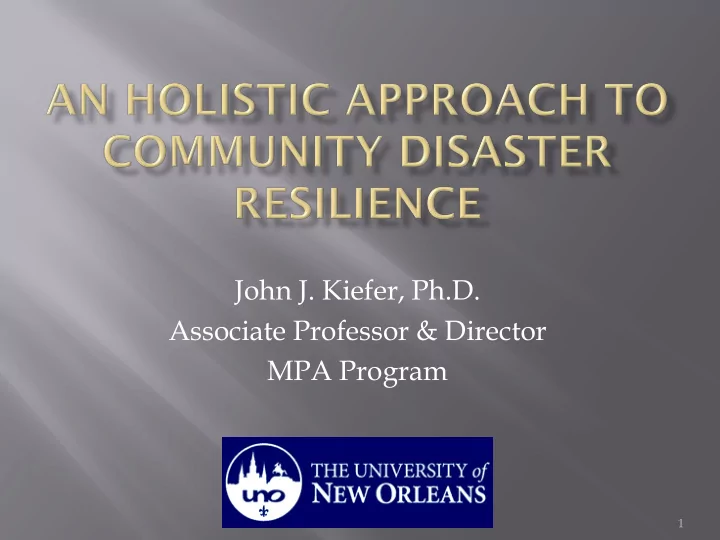

John J. Kiefer, Ph.D. Associate Professor & Director MPA Program 1
2
What makes up your community? • What types of disasters make you • vulnerable? What things are most needed for your • community to return to normal post- disaster? 3
Resilience defined by a community’s ability to absorb disaster impacts and rapidly return to normal socioeconomic activity. This definition requires an understanding of 1) what is meant by a community, 2) what are the major types of disaster impacts, 3) how communities absorb disaster impacts, and 4) how impacted communities return to normal socioeconomic activity. (Lindell) Major impacts are physical impacts and social impacts. The physical impacts are damage and casualties whereas the social impacts are psychosocial, demographic, economic, and political effects of the physical impacts. 4
A systems approach to disaster resilience is dependent upon four “legs”: Resilient Social systems (Comfort) Resilient Technical systems (Comfort) Resilient Political systems (Leavitt & Kiefer) Resilient Business systems (Kiefer & Miestchovich) 5
Social systems were vulnerable in Valdez, remain vulnerable in Gulf. Fishing communities Tourism Increase in social services needs (Lee & Blanchard, 2010) Self-rated stress among respondents has more than doubled since the oil spill compared to a year ago. Nearly 60% of the sample reported feeling worried ALMOST CONSTANTLY DURING THE WEEK PRIOR TO THE INTERVIEW because of the oil spill. More than 8 in 10 respondents are worried about how their family, friends, and fellow community members will make a living over the next couple of years because of the oil spill. Seven in 10 are worried about having to move because of it. This in a context where 60% of the respondents have lived in their community all of their life, and another 20% have lived there at least 20 years. 6
Technical systems were vulnerable in Valdez, were vulnerable in Gulf Failure to gauge the magnitude of the incident Lack of response planning; especially dispersants. Lack of pre-positioning of response assets slowed response, exacerbating impact Failure to follow procedures caused incidents High reliance on private-sector technical expertise Inappropriateness for the company responsible for a disaster to play a large role in determining fixes. 7
Political systems were dysfunctional No Presidential Disaster Declaration in either catastrophe (Sylves) This decision hamstrings recovery efforts in both cases. Challenge for local governments….. How to run a community while still dealing with the disaster Lack of presidential disaster declaration creates special difficulties in getting compensation from oil companies More difficult than with FEMA Example from mayors: BP would pay for extra garbage pickup, but not for extra administrators. 8
Business systems were hit hard Failure to ensure that recovery efforts involve those most adversely impacted in local communities Severely curtailed business revenue impacts – Cripples ability of local governments to continue to provide services, particularly community services Causes layoffs of public officials, teachers This, in-turn, has negative affect on social support services. 9
A holistic approach to creating resilience is necessary Requires well-developed collaborative networking skills Intergovernmental, Intragovernmental, cross-sector e.g. business community, schools, advocacy groups Jenkins, Kiefer & Laska Identification of resource shortfalls, and develop partnerships with agencies that can provide them Requires involvement, education, participation and commitment of political leadership 10
Lack of clear and decisive leadership at the beginning of the response and recovery phase hampers impact assessment, response coordination and recovery effectiveness. Example: Because of public doubts that not enough was being done, the National Incident Command staff believed the need to buy every skimmer they could find. At the same time, responders on the ground were reporting they had more than enough skimming capability (Times-Picayune) 11
12
Recommend
More recommend